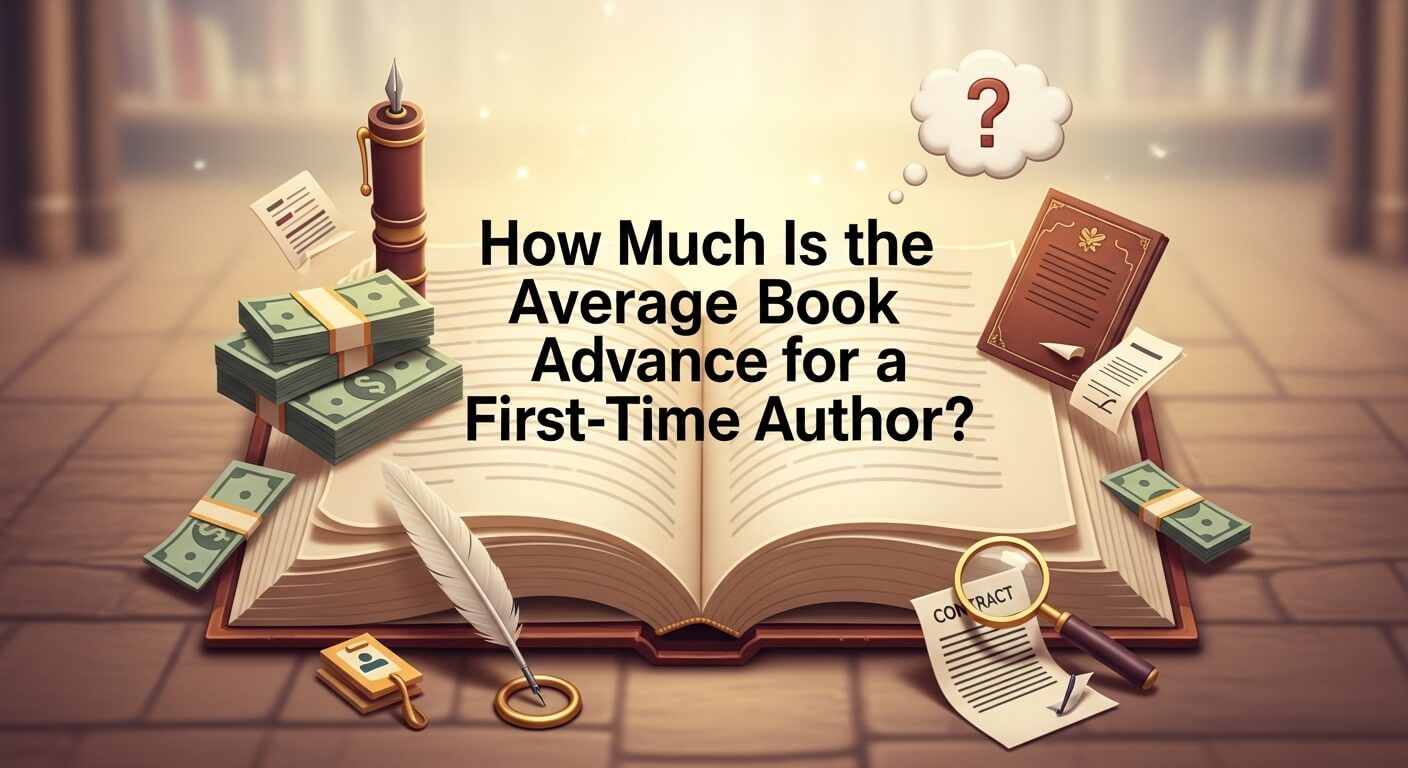How Much Is the Average Book Advance for a First-Time Author?
Publish Your Book View 50% off Pricing
For many aspiring writers, one of the most burning questions when considering a traditional publishing deal is: How much is the average book advance for a first-time author? Understanding this topic is crucial not only for setting realistic expectations but also for planning one’s writing career financially and strategically. In this in-depth guide, we’ll explore everything you need to know about book advances for debut authors—from how advances work, to what influences the amount, to real-world examples and strategies to maximize your chances of securing a solid deal.
The average book advance for a first-time author typically ranges from $5,000 to $15,000, though deals may be as low as $1,000 with small presses or reach six figures with major publishers. Factors like genre, author platform, and agent representation greatly influence the advance amount.
Table of Contents
ToggleWhat Is a Book Advance?
A book advance is a lump sum payment made by a publisher to an author before the book is published. This payment is essentially an advance against future royalties. Once the author earns enough royalties from sales to “earn out” the advance, they may then start receiving additional royalty checks.
For instance, if a publisher offers a $10,000 advance and the royalty rate is $2 per book, the author would need to sell 5,000 copies before receiving any additional royalty payments.
Key Points:
- Advances are paid upfront but in installments (often split across contract signing, manuscript delivery, and publication).
- Authors do not typically repay advances if the book underperforms.
- Advances serve as a financial safety net for authors, particularly helpful while they’re writing and promoting their book.
The Average Book Advance for First-Time Authors
So, what’s the magic number? Unfortunately, there isn’t one. The size of the advance varies significantly depending on the publisher, genre, marketability, and the author’s platform.
Typical Ranges:
- Small/Independent Presses: $1,000 – $5,000
- Mid-Size Publishers: $5,000 – $50,000
- Big Five Publishers: $50,000 – $100,000+
- Outliers: Six-figure or even million-dollar advances, though these are extremely rare
Most first-time authors fall into the $5,000–$15,000 bracket. This means that while high-profile deals make headlines, the reality for most debut writers is much more modest.
Factors That Influence the Size of an Advance
1. Publisher Size and Budget
Larger publishers typically have bigger budgets, allowing them to offer higher advances. Independent presses may prioritize passion projects but rarely have the financial flexibility for large upfront payments.
2. Genre
- Commercial genres (romance, thriller, fantasy) often attract higher advances due to mass-market potential.
- Literary fiction, poetry, and niche nonfiction may command lower advances unless the author already has a strong platform.
3. Author Platform
Authors with a built-in audience—whether through social media, journalism, or public speaking—are more valuable to publishers and may secure higher advances.
4. Marketability and Concept Strength
Unique, timely, or high-concept ideas that fill a gap in the market can attract competitive bidding and higher offers.
5. Agent Representation
Having a skilled literary agent can dramatically increase the size of an advance. Agents negotiate contracts, pitch books to multiple publishers, and create auction scenarios to drive up offers.
6. Comparable Titles
Publishers consider sales figures for similar books when estimating the commercial potential of a new title.
Payment Structure of Advances
Advances aren’t usually paid in a single lump sum. Instead, they are split into multiple payments. A typical breakdown might look like this:
- 25% on signing the contract
- 25% on manuscript delivery and acceptance
- 25% on publication of the hardcover edition
- 25% on publication of the paperback edition
For an advance of $20,000, that could mean $5,000 paid out at each milestone, stretched across several years.
Do Most First-Time Authors Earn Out Their Advances?
Here’s a reality check: most first-time authors do not earn out their advance. According to industry insiders, only about 20–30% of books earn out. That means publishers often invest knowing they may not recoup their full advance but are betting on the author’s potential long-term value.
This doesn’t mean the book was a failure. Publishers may still profit through backlist sales, subsidiary rights (film, TV, translation), or by building the author’s brand for future projects.
Real-World Examples of Debut Advances
- Michael Chabon reportedly received a $155,000 advance for his debut novel in 1988.
- Garth Risk Hallberg made headlines with a $2 million advance for his first novel, City on Fire, after a heated bidding war.
- On the opposite end, countless debut authors receive advances in the $2,000–$10,000 range from small presses or niche publishers.
These examples show the vast disparity in the market and underscore why setting realistic expectations is important.
Advantages of a Lower Advance
While a larger advance might sound like the dream scenario, there are some strategic advantages to a lower advance:
- Higher Chance of Earning Out – This positions you better for future book deals.
- Less Pressure – A smaller investment may give you more freedom to develop your voice and career without the looming shadow of high sales expectations.
- Stronger Long-Term Relationships – Publishers may be more patient with authors whose books have steady, modest performance rather than blockbuster pressure.
How to Increase Your Chances of a Higher Advance
If your goal is to maximize your debut advance, consider these strategies:
1. Build Your Platform Early
Develop a following on social media, start a newsletter, or write articles in reputable publications. Publishers want authors who can help market their books.
2. Craft a Strong Proposal
For nonfiction, the proposal is everything. For fiction, the manuscript must shine. Either way, professional polish makes a huge difference.
3. Secure an Agent
An agent not only negotiates on your behalf but can also spark bidding wars between publishers.
4. Target the Right Publishers
Research imprints that specialize in your genre. Aligning with the right house improves your chances of an attractive offer.
5. Be Flexible but Strategic
Sometimes accepting a smaller advance with a publisher who offers strong marketing support is better than chasing the biggest upfront check.
Advances vs. Royalties: Which Matters More?
While advances get most of the attention, royalties are equally important. After an advance is earned out, authors receive ongoing income from every copy sold. Royalty rates vary, but typical ranges include:
- Hardcover: 10–15% of list price
- Paperback: 5–7.5% of list price
- Ebooks: 25% of net receipts
A strong royalty structure, paired with robust sales, can provide long-term income that far surpasses the initial advance.
Common Myths About Book Advances
Myth 1: “All first-time authors get six-figure advances.”
Reality: The majority receive under $15,000.
Myth 2: “If I don’t earn out my advance, I’ll have to pay it back.”
Reality: Advances are non-refundable in almost all cases.
Myth 3: “A big advance guarantees success.”
Reality: Marketing, timing, and luck play equally large roles.
Myth 4: “Small advances mean the publisher doesn’t believe in me.”
Reality: Smaller publishers simply have smaller budgets, but they may invest deeply in editorial support and niche marketing.
Should You Even Worry About the Advance?
While it’s tempting to focus solely on the advance figure, smart authors consider the entire publishing package:
- How much marketing support is included?
- Will the publisher invest in your long-term career?
- Are subsidiary rights (film, translation, audio) being actively pursued?
- Does the publisher have a strong track record in your genre?
Sometimes, the right publisher with a smaller advance is the smarter choice for your career growth.
Conclusion: Setting Realistic Expectations
So, how much is the average book advance for a first-time author? The honest answer: most debut authors will land somewhere between $5,000 and $15,000, with possibilities ranging from a modest $1,000 to an exceptional six-figure deal.
The size of your advance will depend on many factors, including your platform, your agent, the publisher’s size, and the commercial appeal of your book. But remember, the advance is only one part of a much larger picture. Building a sustainable writing career requires persistence, professionalism, and the ability to deliver compelling work book after book.
Rather than chasing a giant advance, focus on writing the best book you can, developing your audience, and nurturing relationships within the publishing industry. With the right combination of talent, strategy, and persistence, your first book deal can be the foundation of a long and rewarding career.





